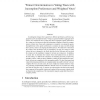Free Online Productivity Tools
i2Speak
i2Symbol
i2OCR
iTex2Img
iWeb2Print
iWeb2Shot
i2Type
iPdf2Split
iPdf2Merge
i2Bopomofo
i2Arabic
i2Style
i2Image
i2PDF
iLatex2Rtf
Sci2ools
AAMAS
2012
Springer
2012
Springer
Winner determination in voting trees with incomplete preferences and weighted votes
In multiagent settings where agents have different preferences, preference aggregation can be an important issue. Voting is a general method to aggregate preferences. We consider the use of voting tree rules to aggregate agents’ preferences. In a voting tree, decisions are taken by performing a sequence of pairwise comparisons in a binary tree where each comparison is a majority vote among the agents. Incompleteness in the agents’ preferences is common in many real-life settings due to privacy issues or an ongoing elicitation process. We study how to determine the winners when preferences may be incomplete, not only for voting tree rules (where the tree is assumed to be fixed), but also for the Schwartz rule (in which the winners are the candidates winning for at least one voting tree). In addition, we study how to determine the winners when only balanced trees are allowed. In each setting, we address the complexity of computing necessary (respectively, possible) winners, which a...
| Added | 19 Apr 2012 |
| Updated | 19 Apr 2012 |
| Type | Journal |
| Year | 2012 |
| Where | AAMAS |
| Authors | Jérôme Lang, Maria Silvia Pini, Francesca Rossi, Domenico Salvagnin, Kristen Brent Venable, Toby Walsh |
Comments (0)

